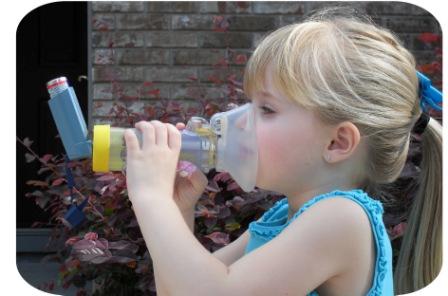May is Asthma Awareness Month
By: Cindy Capen M.S.N., R.N. and Leslie Hendeles Pharm.D.
Why do we need to be aware of asthma?
It is common, costly and usually controllable without need for emergency care and yet, in 2009, there were 42,238 emergency department visits and 7,646 hospitalizations with asthma listed as the primary diagnosis among Florida children below the age of 18. The total combined charges for these visits amount to nearly $222 million (Florida Asthma Prevention and Control Program: Childhood Asthma in Florida 2006-2010). Shands at the University of Florida treated and released 445 children under the age of 18 in the emergency room between March 2010 and February 2011. Additionally, 198 pediatric patients and were admitted, 47 of which, to the Pediatric Intensive Care Unit.
Asthma isn’t just costly in health care dollars, it is a wider community health problem. Poorly managed asthma can impact school attendance and educational success for children, which consequently effects employment attendance and stability for parents, leading to a ripple effect on employers.
In 1989, the first Expert  Panel Report of the National Asthma Education and Prevention Program, coordinated by the National Heart, Lung, and Blood Institute raised awareness about asthma as a major public health problem and provided clinical practice guidelines. This report has been updated twice, and in 2012 it was condensed into an Asthma Care Quick Reference. It is the standard for asthma identification and management in the United States and has been taught to generations of pediatric residents at the UF.
Panel Report of the National Asthma Education and Prevention Program, coordinated by the National Heart, Lung, and Blood Institute raised awareness about asthma as a major public health problem and provided clinical practice guidelines. This report has been updated twice, and in 2012 it was condensed into an Asthma Care Quick Reference. It is the standard for asthma identification and management in the United States and has been taught to generations of pediatric residents at the UF.
UF&Shands provides optimal asthma management through convenient access to pediatric pulmonary specialists and physicians, as well as an interdisciplinary team approach to outpatient asthma education and a coordinated community response program for the most severe asthmatics.
Intensive provider training is also offered to healthcare professionals and students. The UF Pediatric Pulmonary Center Training Program is a Health Resources and Services Administration-funded interdisciplinary leadership program that prepares trainees for clinical care, patient education, family partnership and advocacy/policy change related to pediatric asthma. As part of the program’s mandate, faculty and trainees have also conducted more than 400 presentations in the past five years, and have also developed several online continuing education modules on asthma.
The most recent internal advancement is the Pediatric Asthma Center of Excellence, or PACE, which aims to further improve outcomes for the children we serve. PACE combines the expertise of pediatric pulmonologists, clinical pharmacists, hospitalists, respiratory care staff and the emergency room to improve coordination for patients.
Its goals include:
- Decreasing hospitalization of children seen in the emergency room
- Decreasing hospital stay durations for children who require admission
- Referring children with chronic asthma to the pediatric pulmonary clinic for education and care management
- Improving education in the administration and use of maintenance medications in the emergency room and inpatient setting
- Increasing the availability of Certified Asthma Educators in the hospital and emergency room
The Florida Asthma Prevention and Control Program, which is funded by the CDC, facilitates the Florida Asthma Coalition and is working specifically to increase the number of childcare centers, schools and hospitals that implement asthma management programs. Its Asthma Friendly Schools and Childcare Centers program offers education and other support services to schools and childcare centers that strive to achieve recognition for their efforts on improving environmentally and through personnel training. UF faculty members have been actively involved in this effort at both the community and state levels, serving on program and guideline development committees and as mentors for area program development.
To learn more about asthma, please click here and visit the PACE website here.

